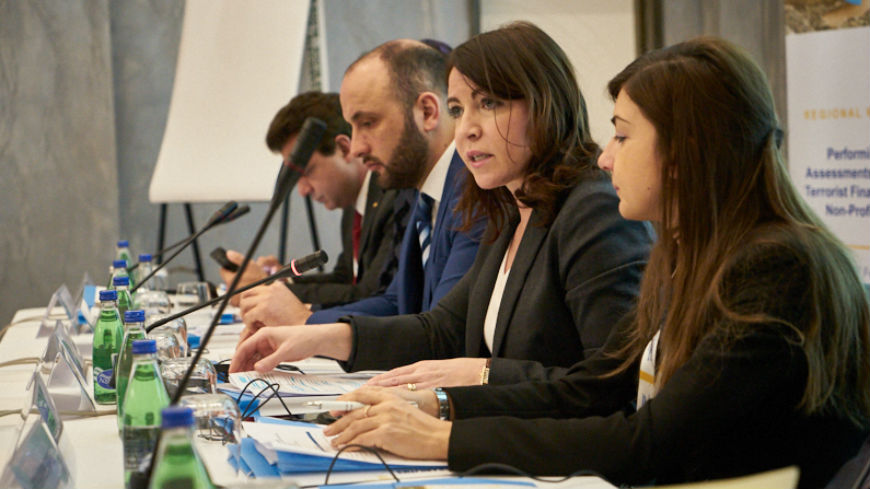It is necessary for the competent institutions to have the capacity to comprehensively assess the risks of financing terrorism through the non-profit sector, while ensuring that such assessments do not unreasonably impair the integrity and legally protected activities of civil society.
This was announced at the opening of a two-day Regional Workshop on "Performing risk assessments in the fight against terrorist financing through the non-profit sector" organized by the Council of Europe's Anti-Economic Crime and Co-operation Council and the Council of Europe Program Office in Podgorica, which gathered representatives in Tivat from Albania, Bosnia and Herzegovina, Montenegro, Northern Macedonia, Serbia, Kosovo * and Turkey.
Director General of the Directorate for Strategic and Development Affairs in the Ministry of the Interior, Safet Korać, pointed out that non-profit organizations in Montenegro played a very important role in the development of civil society and the provision of various types of social services, therefore, he said, it was necessary to protect them from risk and abuse.
"Regional exchange of experiences in this area is particularly important because organizations operating in border areas are at the highest risk of misusing, and their detection and sanctioning depends on cooperation with neighbouring countries," explained Korać.
Until now, as he said, there were no cases of financing of terrorism through non-profit organizations in Montenegro, but, he added, efforts were invested in establishing a legal and institutional framework for adequately responding to this challenge.
"Accordingly, last year, with the help of the Council of Europe, the Law on the Prevention of Money Laundering and Financing of Terrorism was amended and the Law on International Restrictive Measures was enacted; moreover, activities on updating the National Assessment of Money Laundering and Terrorism Financing from 2015 have commenced, "Korać said.
Montenegro will, as he said, take further steps to fulfil MONEYVALA's recommendation regarding the establishment of effective control over the non-profit sector in the field of preventing money laundering and terrorist financing in order to ensure that specific risks are identified and measures for mitigation are developed.
Head of the Programme Department at the Office of the Directorate General of Programmes - Council of Europe, Pilar Morales, pointed out that the horizontal mechanism was increasingly focusing on the regional dimension, because, as she explained, all project users encountered similar challenges on the road to the European Union.
"It is clear that the fight against terrorism is one of these common challenges, and progress in the fight against terrorism is measured regularly through the reports of the European Commission in the course of negotiations on EU accession," explained Morales.
According to her, the Financial Action Task Force (FATF) recognized that non-profit organizations were at risk of financing terrorism and, therefore, as she said, developed standards in that area.
"The risk is regularly evaluated by the Council of Europe MONEYVAL Council (Committee for the Evaluation of Money Laundering and Terrorist Financing Measures) in each of the relevant countries. And today and tomorrow, we will have a discussion about these standards and good international practices to address these risks. In the next two days, you will have the opportunity to talk with our experts about these very important topics, "said Morales.
She said that the representatives of the Council of Europe were intensively cooperating with governments and the civil sector in the member states and in those that were not members so that, as she explained, the non-profit organizations could be independent in accordance with positive regulations granting them the freedom of association and expression.
"We are also aware that non-profit organizations can be misused for other purposes. That is why we are here today and we will work to resolve the challenges, including the financing of terrorism as a risk, which facilitates the recruitment of new fighters, so-called foreign fighters, "said Morales.
Jelena Jolić, a representative of the Department for Combating Economic Crime and Co-operation in the Council of Europe, believes that the countries of the region share similar problems and that there are cross-border issues where "you can cooperate in an attempt to respond to them."
"I urge you not only to seek information from our experts, but also to talk to each other to understand how different jurisdictions act upon these problems and how you can help each other with this problem, especially having in mind that all your jurisdictions had, to a greater or lesser extent, problems with the financing of terrorism and the involvement of various non-profit organizations in these activities, "Jolić said.
As she explained, it was not only a state, but also a civil sector issue.
"For that reason, we have made efforts to include representatives of the civil sector as participants and experts. It would be good to see where we have good practical solutions, related to specific problems. And if we do not have them, we may be able to devise new solutions based on shared experiences, "Jolić said.

The aim of the workshop is to help improve the implementation of standards in the field of analysing the risk financing terrorism through the non-profit sector in the Western Balkans and Turkey, as well as strengthening regional cooperation in this area.
The workshop is delivered in the framework of the joint program of the European Union and the Council of Europe "Horizontal Facility for the Western Balkans and Turkey", with the support to the participants from Kosovo* by the European Union / Council of Europe Project on Combating Economic Crime in Kosovo * (PECK II).
* This name is without prejudice to status, and in accordance with UN Security Council Resolution 1244 and the opinion of the International Court of Justice on the Declaration of Independence of Kosovo.



